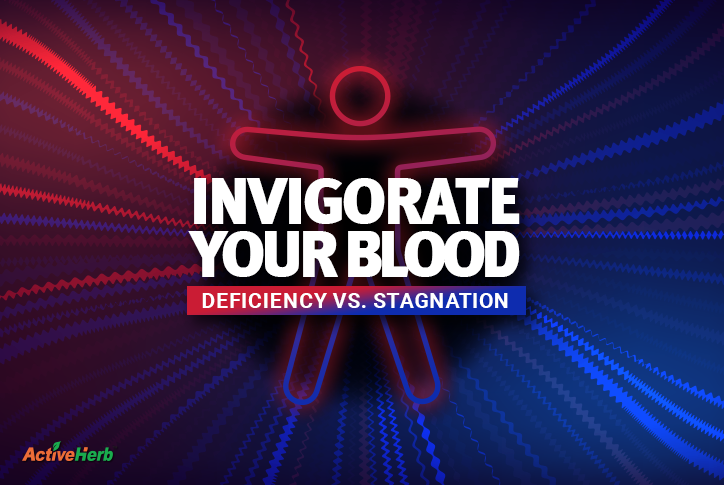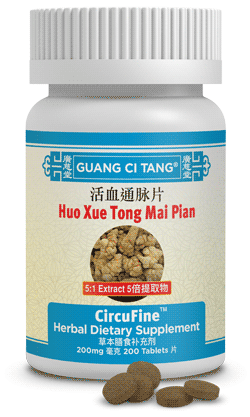Invigorate The Blood! Blood Deficiency vs. Stagnation in TCM

Want to live a long and healthy life?
Prescription #1 in TCM: invigorate your blood!
What exactly does that mean?
And what’s the difference between Blood Deficiency and Blood Stagnation—the two major TCM patterns that hinder optimum blood circulation? Why is it important to invigorate the blood? And how can you tell if you need your blood “invigorated?” Let’s explore these topics…
What does “Invigorate The Blood” mean in TCM?
Consider the Lamborghini, one of the sleekest luxury sports cars ever created. A “Lambo” blends striking elements of engineering, design and performance; it’s more a work of art than a mode of transportation. So what do Lambos have to do with the concept of invigorating the blood in Traditional Chinese Medicine (TCM)?
Well, let’s say that a person has undergone plastic surgery to maintain a more youthful appearance. In other words, they want their outward look to resemble a Lambo. But on the inside, their organs, tissues and cells function more like a Ford Pinto.
In TCM, it’s not what’s on the outside that counts. Rather, it’s the balance of the internal body, mind and spirit that matter the most. In other words, in TCM, it’s better to look like a Ford Pinto on the outside and have an internal operating system that runs like a Lambo.
And one of the most important factors in having a finely-tuned internal bodily engine, if you will, is having “invigorated” blood.
Invigorating the blood refers to the promotion of healthy circulation and optimal flow of blood throughout the body.
Blood Deficiency Vs. Blood Stagnation
In TCM, blood is the material basis of life and the primary substance responsible for nourishing the body’s organs, tissues, and cells. When blood circulation is flowing perfectly, nutrients are efficiently transported, waste products are effectively eliminated, and joints are better lubricated. Overall vitality and good health aren’t a 100% guarantee if you have optimal blood circulation. But your chances of looking and feeling like a Lambo improve when blood is invigorated.
But there are two enemies of optimal blood flow: stagnation and deficiency. In TCM, these two terms are sometimes used interchangeably. However, there is a difference between the two…
Blood Deficiency
As the name implies, Blood deficiency refers to an inadequate quantity of blood. In the immediate minutes after you donate blood, when a female menstruates or when someone suffers a serious wound, blood deficiency occurs.
But it’s not just the quantity of blood that matters. It’s also the quality of blood. “Poor blood,” that is, poor blood quality, leads to insufficient production or circulation of blood. This results in a diminished ability to nourish and sustain the body’s tissues and organs.
So what causes blood deficiency? Contributing factors include persistent health problems, poor diet, weak organ function, and excessive bleeding. And what are some of the tell-tale signs that you have blood deficiency?
- Pale complexion
- Frequently tired/lacking energy
- Dizziness
- Poor concentration
- Dry skin
- Brittle nails
- Slow wound healing
- Dry stool
- Hair loss
- Occasional sleeplessness
- Irregular menstruation
Blood Stagnation
Imagine a creek in the southwest U.S. In the summertime, the flow of the creek is almost nonexistent. If we were to compare water in the creek to blood in TCM, we would say that the creek flow is deficient. But a creek can fill fast when the monsoonal rains come in late summer. However, if there’s debris in a certain area of the riverbed, water flow is impeded, becoming stagnant.
Carrying the analogy, in TCM, blood stagnation occurs when blood pools in a certain area of the body, such as the lower extremities. Stagnant blood flow can result from various factors, such as a sports injury or underlying health conditions.
Blood stagnation most often presents with discomfort in isolated areas of the body. In comparison, blood deficiency often results in more general stiffness throughout the body. Besides having localized discomfort such as sharp or stabbing sensations, other symptoms of blood stagnation include:
- Dark or clotted menstrual flow
- Varicose veins
- Purple or dark discoloration of the skin
- Coldness in the affected area
Why It’s Important to Invigorate the Blood
There are a few primary reasons you should consider optimizing your blood flow. For example, invigorating the blood 1) enhances organ function, such as the Spleen, which is essential for optimal digestion; 2) balances Qi (energy); 3) supports musculoskeletal health; and 4) promotes healthy menstruation.
How to Invigorate the Blood in TCM
If your body feels more like a Fort Pinto than a Lambo, how can you fine-tune your internal engine? Unfortunately, it’s not as simple as getting an oil change, but TCM offers some fairly easy approaches to invigorate the blood.
Here are a few practices that can support blood circulation:
- Exercise regularly: Engaging in moderate physical activities such as walking, swimming, or tai chi promotes blood flow, enhances cardiovascular health, and invigorates the blood.
- Apply heat: Using warm compresses or baths can help dilate blood vessels, improve circulation, and relieve blood stasis.
- Eat blood-nourishing foods: Incorporate dark leafy greens, beets, berries, and lean proteins like chicken or fish into your diet. These foods are believed to nourish the blood and enhance circulation.
- Avoid excessive cold: In TCM, exposure to cold temperatures is believed to constrict blood vessels and hinder blood flow. Listen to your mom and wear a jacket! And don’t forget a scarf, too. In TCM theory, a Wind-Cold invasion enters just below the occiput (the back, lower part of the skull).
- Cold plunging!
Yes, this advice is a giant contradiction to the recommendation to avoid excessive cold. But “cold plunging,” one of the most recent health trends, which people have been doing for health for thousands of years, may improve circulation. Briefly immersing the body, sans tête, in a very cold bathtub or body of water, says a 2022 study “seems to reduce and/or transform body adipose tissue, as well as reduce insulin resistance and improve insulin sensitivity. This may have a protective effect against cardiovascular, obesity and other metabolic diseases and could have prophylactic health effects.” More studies are needed to confirm these findings, however.
Herbal formulas that invigorate the blood
Chinese herbs are time-tested over many centuries to support blood circulation. These include:
Si Wu Tang (“Four-Substance Decoction”; Tonics4™):
This is the foundational blood tonic formula for pre-menopausal women, composed of just four herbs: Dang Gui (Chinese Angelica), Bai Shao (White Peony Root), Chuan Xiong (Ligusticum), and Shu Di Huang (Rehmannia).
Xue Fu Zhu Yu Tang (“Drive Out Stasis in the Mansion of Blood Decoction”; Blood Stasisclear™)
A powerful weapon against blood that has pooled or become stagnant in one area of the body (blood stasis), Xue Fu Zhu Yu Pian is a complex formula containing 11 herbs. Specifically designed to address blood stasis in the chest and abdominal regions, Xue Fu Zhu Yu Tang is commonly used for conditions such as chest discomfort and certain cardiovascular concerns.
Shen Tong Zhu Yu Pian (“Remove Stagnant Blood from a Painful Body; StasisClear™)
Resolves blood deficiency to support circulation and contains Dang Gui, Shu Di Huang, E Jiao, and Huang Qi (Astragalus Root). A well-regarded overall blood invigorator for general symptoms of blood deficiency.
Huo Xue Tong Mai Pian (“Blood Activating and Collateral Opening Tablets”; CircuFine™)
Do you tend to run cold? Does your skin, lips and nails look like you’ve been wintering in Siberia? Circufine has potent blood-moving qualities, containing 11 herbs that resolve blood stasis, warm the blood and invigorate the blood.
Conclusion
ActiveHerb.com also offers traditional formulas that support heart health. For best results, consult a qualified TCM practitioner who can asses your specific constitutional type, symptoms, and overall health condition. Here’s to having invigorated blood for optimal health!







